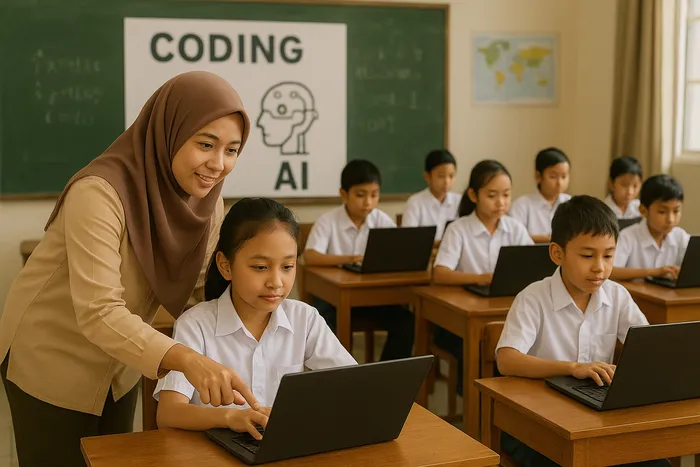Coding and AI implementation in Indonesia

Image: Generated
Indonesia is proactively preparing its youth for a technology-driven future by integrating computer programming and artificial intelligence into the Sekolah Rakyat curriculum. Education Minister Abdul Mu'ti characterises this approach as "mindful, meaningful, and joyful learning," prioritising deep understanding, practical application, and critical reflection over mere rote memorisation. This initiative aims to go beyond teaching coding syntax or introducing superficial tools; it seeks to cultivate computational thinking, problem-solving skills, and adaptability, essential qualities for future success. Other education systems provide evidence for the value of early exposure to programming. Estonia's ProgeTiger initiative, for example, is recognised globally for integrating programming across various subjects instead of treating it as a separate field. This approach allowed students to develop digital competence alongside traditional learning, with systematic support for teachers. Indonesia's initiative aims for a similar comprehensive approach, but its success hinges on the government's ability to establish the necessary structural framework to achieve these goals.
Structural Barriers to Realisation
There are clear, interconnected obstacles. Firstly, teacher readiness is insufficient. Despite Indonesia's experience with online training and digital teaching tools during the pandemic, teachers still lack sustainable mastery in coding and AI pedagogy. While the Ministry's collaboration with industry partners like Google is promising, it needs to evolve beyond pilot programs into a nationwide system of accredited, tiered professional development. Internet access varies greatly throughout the archipelago. According to World Bank analyses, genuine broadband capacity is concentrated in wealthier provinces, despite many schools having some internet access. Remote schools, however, still face challenges with unreliable electricity and insufficient devices. This disparity threatens to deepen existing inequalities, potentially making coding and AI a luxury for urban students rather than an accessible tool for all. Third, national coordination is crucial. Indonesia's national AI strategy, which includes discussions on sovereign investment funds and industrial roadmaps, should guide educational institutions. Aligning education with workforce planning, regional equity, and digital economy objectives will prevent fragmented implementation and ensure schools operate within this broader framework.
Lessons from Global Comparisons
Other nations offer lessons and warnings. The United Kingdom's decision to integrate computing into its national curriculum sparked enthusiasm but revealed a lack of teacher confidence and widened existing gender disparities in STEM, necessitating specific interventions. In contrast, Singapore has progressively developed digital education through ongoing teacher training, alignment with national economic strategies, and a consistent emphasis on fairness. Estonia's early integration of computational skills showcases how this can provide a national advantage. However, scaling such initiatives was simpler there due to its smaller size and centralised governance, unlike the more intricate challenges faced by Indonesia. Indonesia's situation is complicated by its 17,000 islands, significant discrepancies in school funding, and ongoing learning setbacks from the pandemic.
The Stakes for Indonesia’s Future
With its young and dynamic population, Indonesia is poised to have the largest digital economy in Southeast Asia. For Sekolah Rakyat to foster digital inclusion rather than exacerbate inequality, coding and AI must be integrated strategically. This requires Jakarta to prioritise investment in teacher training and reliable connectivity as much as curriculum development. Furthermore, "unplugged" coding exercises and other low-tech, offline adaptations will be essential for schools lacking dependable infrastructure. The ambition is commendable, and the timing is opportune, as global industries are currently undergoing transformation driven by automation, data, and digital intelligence. However, policy ambition alone is insufficient. Without meticulous implementation, Indonesia faces the risk of exacerbating its existing educational disparities under the guise of innovation. Nevertheless, if executed effectively, this initiative could signify a pivotal moment, not only establishing Sekolah Rakyat as a genuine avenue of opportunity for students but also positioning Indonesia as a frontrunner in embedding future-ready skills into the core of public education.
By Sesona Mdlokovana
Associate at BRICS+ Consulting Group
African Specialist
**The Views expressed do not necessarily reflect the views of Independent Media or IOL.
** MORE ARTICLES ON OUR WEBSITE https://bricscg.com/
** Follow https://x.com/brics_daily on X/Twitter for daily BRICS+ updates
Related Topics: